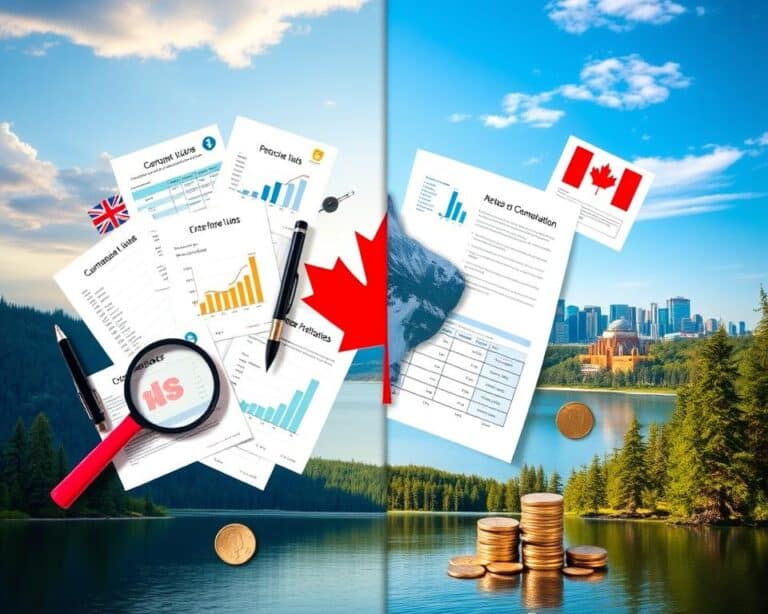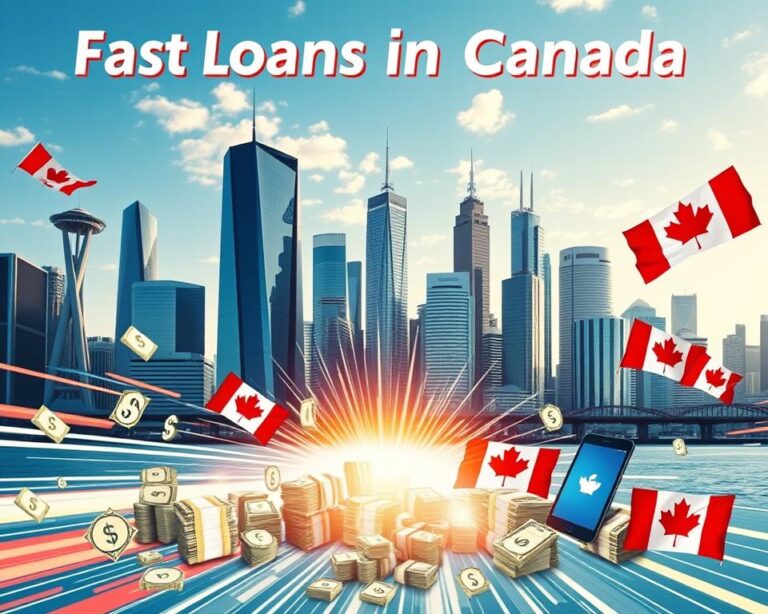advertisement
Did you know about 5.4 million Canadians have bad credit? This shows how tough it can be to get financial help. If you’re dealing with bad credit, knowing your options is key.
Bad credit loans in Canada can help with unexpected costs or rebuilding your credit. Many lenders offer loans for those with poor credit. This means you can start working towards a better financial future.
We’ll look at the top loans for bad credit in Canada. We’ll help you understand your choices. This way, you can make smart decisions to improve your finances.
Understanding Bad Credit in Canada
In Canada, knowing about bad credit is key to managing your money. Bad credit happens when your credit scores drop due to various reasons. This makes it hard to get loans or credit cards. Learning what causes bad credit helps you borrow money wisely.
What Constitutes Bad Credit?
Several things can lower your credit score:
- Late payments: Missing payments on loans and credit cards can severely impact your credit ratings.
- High credit utilization: Using a high percentage of your available credit often indicates financial hardship.
- Defaults: Failing to repay loans can lead lenders to report adverse information to credit bureaus.
Canadian credit bureaus set a score range. Scores below 650 are considered bad credit. Knowing this helps you understand your financial health.
Impact of Bad Credit on Your Financial Options
A low credit score limits your financial choices. You might face:
- Difficulties obtaining loans: Lenders see you as a high-risk borrower, making approvals less likely.
- Higher interest rates: If you do qualify for a loan, expect to face elevated interest rates due to your credit history.
- Limited access to credit cards: Cards for those with good credit may not be available to you, limiting your purchasing power.
Improving bad credit takes time and effort. But understanding its effects helps you borrow money more wisely and achieve financial stability.
Types of Loans Available for Bad Credit
When you face bad credit, knowing your options is key. There are several loans made for people with less-than-perfect credit. Learning about these can help you make smart financial choices.
Personal Loans for Bad Credit
Personal loans for bad credit often have flexible repayment terms and lower interest rates. They can be used for many things, like paying off debt or covering emergencies. Many lenders are open to working with you, even with bad credit, making these loans a good option.
Payday Loans and Their Risks
Payday loans have very different repayment terms. They have high interest rates and short repayment periods, which can trap you in debt. If you’re thinking about a payday loan, be aware of the potential long-term damage to your finances. Understanding the risks can help you make better choices.
Secured vs Unsecured Loans
Secured and unsecured loans have key differences. Secured loans need collateral, like your home or car, which can lower interest rates. But, there’s a risk of losing that asset if you can’t pay back the loan. Unsecured loans don’t need collateral but might have higher interest rates and stricter rules.
| Loan Type | Collateral Needed | Interest Rates | Repayment Terms |
|---|---|---|---|
| Personal Loans | No | Moderate | Flexible |
| Payday Loans | No | Very High | Short (usually 2-4 weeks) |
| Secured Loans | Yes (e.g., home, vehicle) | Low to Moderate | Longer (months to years) |
| Unsecured Loans | No | High | Fixed terms (months to years) |
Loans for Bad Credit Canada
Looking for financial help with bad credit? Knowing your options is key. Many lenders offer loans for those with credit issues. These bad credit lenders help you take back control of your finances. You can explore different options, from alternative financing to government programs that provide financial aid.
Specific Lenders Offering Bad Credit Loans
In Canada, many institutions help people with bad credit. Here are some notable lenders:
- Fairstone – Known for personal loans, Fairstone offers flexible terms and quick approvals for those with less-than-perfect credit.
- Mogo – An innovative online lender offering loans and a credit monitoring service aimed at improving your financial health.
- CashCo Financial – Focuses on short-term loans to help consumers facing immediate cash flow issues, regardless of their credit score.
Government Assistance Programs
The Canadian government has programs for those with bad credit.
- Government Loans – Various federal and provincial programs offer low-interest loans for specific demographics, such as students or low-income families.
- Grants – Some initiatives provide financial assistance that does not require repayment, beneficial for individuals in financial distress.
- Emergency Funds – Specific government-backed funds are available to help with unexpected expenses that might arise.

Looking into these lending options and government programs can greatly improve your financial situation. It can lead to a brighter financial future.
| Lender | Type of Loan | Key Features |
|---|---|---|
| Fairstone | Personal Loan | Flexible terms, fast approval |
| Mogo | Online Loan | Credit monitoring service, competitive rates |
| CashCo Financial | Short-term Loan | Quick cash access, no credit check |
| Government Loans | Low-Interest Loans | Available for specific groups |
| Grants | Non-repayable Financial Aid | Assistance for financial distress |
How to Apply for a Loan with Bad Credit
Getting a loan with bad credit can seem tough, but it’s doable with the right steps. Knowing how to prepare your application can really help. It shows you’re ready to handle the loan responsibly, even with bad credit.
Understanding what documents you need is key. Making sure you have all the right paperwork can help you get approved.
Preparing Your Application
Start by improving your credit score. Check your credit report for errors and fix them. Also, try to pay off debts to lower your debt-to-income ratio. This shows lenders you’re serious about managing your money well.
Documents You May Need
For a loan application, you’ll need to show you’re financially stable. Here are some important documents to gather:
- Government-issued identification (e.g., driver’s license or passport)
- Proof of income (such as recent pay stubs or tax returns)
- Bank statements from the last few months
- Current employment verification letter
- Your credit report, especially if you have already raised your score
Having these documents ready can make the approval process smoother. It also shows lenders you’re serious about getting the loan, which is important for bad credit approval.
| Required Document | Description |
|---|---|
| Government ID | Valid identification to verify your identity. |
| Proof of Income | Recent pay stubs or tax returns to show your earning potential. |
| Bank Statements | Reflects your financial activity and stability over the last few months. |
| Employment Verification | A letter confirming your current job status. |
| Credit Report | Shows your credit history and current standing. |
Comparing Interest Rates and Terms
It’s important to know about interest rates and loan terms when you have bad credit. By comparing these, you can find a loan that fits your budget and goals.
Understanding APR and Its Importance
The Annual Percentage Rate (APR) shows the total cost of borrowing. It includes interest rates and fees. This helps you see the total cost of a loan.
Knowing the APR helps you decide if a loan is affordable. Always check the APR when comparing loans. This ensures you make a good choice for your situation.
Fixed vs Variable Interest Rates
There are two main types of interest rates: fixed and variable. Fixed rates stay the same, making your payments predictable. This is great for budgeting without surprises.
Variable rates change with the market. They might start lower, but could go up, affecting your payments. Knowing the difference helps you pick the right loan for you.
| Type of Rate | Pros | Cons |
|---|---|---|
| Fixed Rates | Stable monthly payments Easier budgeting Protection from market rate increases | Generally higher initial rates No potential for lower payments if rates drop |
| Variable Rates | Lower initial rates Potential for reduced payments if rates drop | Monthly payments can increase Less predictable budgeting |
Choosing between fixed and variable rates depends on your comfort with risk and financial goals. Understanding these rates helps you make a smart loan choice, even with bad credit.
The Role of Credit Unions in Bad Credit Financing
Credit unions are key for people looking for bad credit financing. They are owned by their members and offer more personal service than banks. They also have terms that help those with poor credit to borrow money.
Benefits of Choosing a Credit Union
Choosing a credit union has many benefits:
- Lower Fees: They often have lower fees than banks.
- Personalized Service: You get support that fits your financial needs.
- Flexible Lending Criteria: They look at your whole financial picture, not just your credit score.
- Membership Benefits: You get perks like lower interest rates on loans.
How to Find Local Credit Unions
Finding a credit union near you is easy. Here’s how:
- Use online directories to find local credit unions.
- Ask friends and family for recommendations.
- Visit local community centers for information on credit unions.
- Check with regional leagues or trade associations for credit unions.
Improving Your Chances of Loan Approval
To get a loan with bad credit, you need to improve your credit score and financial health. By doing this, you boost your chances of getting approved. It also helps you build a better financial future.
Ways to Improve Your Credit Score
Boosting your credit score takes time and knowing what lenders want. Here are some strategies to help:
- Pay bills on time to show you’re reliable.
- Lower your debt. Keep your credit use low.
- Check your credit reports for mistakes and fix them.
- Don’t open too many new credit accounts, as it can harm your score.
Building a Positive Financial Profile
A solid financial profile makes lenders more confident in you. This can lead to better loan chances. Here are some tips:
- Have a steady income to prove you can repay loans.
- Be smart with your spending to show you can handle money.
- Start saving to show you’re financially stable.
- Use secured credit cards to build credit safely.
By following these tips, you can improve your credit score and financial health. Remember, improving your credit takes time. But, the rewards for future loans can be huge.
Alternatives to Traditional Loans
For those with bad credit, there are ways to get funds without traditional banks. Peer-to-peer loans are a popular choice. They let people borrow money directly from others, often with better terms.
Peer-to-Peer Lending Platforms
Peer-to-peer loans connect borrowers with investors online. This skips the high fees and strict rules of banks. The perks include:
- Lower interest rates than credit cards and payday loans.
- Flexible repayment plans that fit your needs.
- Quick approval, so you get money when you need it.
Investors look at your repayment potential, not just your credit score. This helps those who might be turned down elsewhere.
Co-Signers and Joint Applications
Having a co-signer can really help you get a loan. A co-signer with good credit makes your application safer. This can mean better rates and terms. Joint loans also share the repayment burden, making you more likely to get approved. The benefits are:
- Lower interest rates because of the combined credit.
- Higher chances of approval with both applicants’ credit considered.
- Less stress on repayment since it’s shared.
Common Mistakes to Avoid When Seeking Loans
Dealing with loans can be tough, especially when you have bad credit. Knowing common loan mistakes can help you avoid trouble. Here are two big mistakes to avoid.
Ignoring the Fine Print
Many people skip over the fine print in loan agreements. This can cause big problems later. The fine print importance is huge. It has key info on fees, interest rates, and other financial stuff.
Not reading and understanding these details can lead to unexpected costs. This can make your financial situation worse. Being informed is key to borrowing responsibly.
Over-Borrowing and Its Consequences
Getting into debt by borrowing too much is a big mistake. It’s tempting to take out big loans, but it can trap you in debt. Think about how much you really need and what you can pay back.
Being careful with your borrowing helps you avoid too much debt. Your goal should be to get a loan that helps your finances, not hurts them.

| Mistake | Impact | Solution |
|---|---|---|
| Ignoring Fine Print | Hidden fees and unfavorable terms | Read all terms carefully |
| Over-Borrowing | Cyclical debt and financial strain | Borrow only what you need |
Success Stories: Overcoming Bad Credit
Stories of people beating bad credit are truly inspiring. These success stories show that credit recovery is possible with hard work and the right plan. People have managed loans and followed personal finance tips to fix their credit. Let’s look at some amazing examples.
Real-Life Examples of Loan Success
Many have turned their finances around with persistence and smart choices. Here are a few examples:
- A woman got a personal loan to start her business. She also learned to budget well, paying off debt in a few years.
- A couple with bad credit got a secured loan to pay off high-interest debts. They made consistent payments, improving their credit scores a lot.
- An individual joined a financial education program by a local nonprofit. It taught them how to manage credit, greatly improving their score.
Tips from Individuals Who Have Rebuilt Their Credit
People who have overcome bad credit share valuable personal finance tips. Here are some strategies they used:
- Always pay your debts on time to build a good payment history.
- Use credit wisely, like keeping your credit card balances low.
- Keep learning about credit scores and what affects them.
- Make a budget that includes debt payments and stick to it.
- Get professional help when dealing with complex financial issues.
These stories and tips show that you can beat financial challenges and improve your credit. Whether it’s through loans or budgeting, you can get better credit.
Conclusion
Understanding your financial situation is key to financial empowerment. Bad credit is not the end. We’ve looked at loan options, risks, and how to get approved. By taking action, you can find the right financial support for you.
There are many ways to improve your credit over time. Personal loans, credit unions, and other options can help. Every step you take moves you closer to a secure financial future.
Stay informed and aware of your options. Improve your credit and explore different financial resources. This path leads to lasting financial stability. It’s never too late to take control of your finances and look forward to a brighter future.
FAQ
What are bad credit loans?
Bad credit loans are for people with low credit scores. They help you get money even if you’ve had financial problems before. This can be for urgent needs or to manage debt.
How can I improve my credit score quickly?
To boost your credit score fast, pay bills on time and lower your credit use. Also, check your credit report for errors and fix them. Keeping an eye on your credit helps you stay on track.
Are payday loans a good option for bad credit?
Payday loans might seem easy, but they have high interest and short payback times. This can lead to debt traps. Look at other options first.
What documents do I need to apply for a loan with bad credit?
You’ll need ID, proof of income, bank statements, and your credit history. Having these ready can make your loan application stronger.
Can I apply for loans with a co-signer if I have bad credit?
Yes, a co-signer with good credit can help you get a loan. They act as a guarantee for the lender. This can also lower your interest rates.
What is the difference between fixed and variable interest rates?
Fixed rates stay the same, so your payments are always the same. Variable rates can change with the market, affecting your total repayment. Knowing both can help you choose wisely.
Are there government assistance programs for people with bad credit?
Yes, there are government programs offering low-interest loans or grants for bad credit. These can help you financially. But, they vary by area and who can apply.
How do credit unions help individuals with bad credit?
Credit unions offer personal service, lower fees, and flexible loans. They focus on helping members, even those with bad credit. This can mean better loan terms for you.
What mistakes should I avoid when applying for bad credit loans?
Always read the fine print to avoid hidden fees. Don’t borrow more than you can handle. This can prevent debt cycles and financial problems.
Can I rebuild my credit after taking out a bad credit loan?
Yes, making timely payments and managing debt well can improve your credit. Use your loan to help your financial health and credit score.



